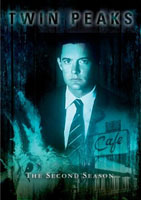 BUY IT AT AMAZON: CLICK HERE!
BUY IT AT AMAZON: CLICK HERE!
STUDIO: CBS Television / Paramount
MSRP: $54.99
RATED: NR
RUNNING TIME: 1081 minutes
SPECIAL FEATURES:
• Log Lady Introductions
• Cast and Crew interviews
The Pitch
FBI
Special Agent Dale Cooper has been shot and the town of
from the unsolved murder of Laura Palmer. As her killer is identified, the
Peaks populace is embroiled in a dozen plots ranging from quirky to pointless
in the second (and final) season of one of television’s most influential
series, ending with a bizarrely violent teeth cleaning session.
The Humans
Kyle
MacLachlan; Michael Ontkean; Richard Beymer; Ray Wise; Grace Zabriske; Sherilyn
Fenn; Lara Flynn Boyle; Madchen Amick; Dana Ashbrook; David Lynch; Michael
Horse; Warren Frost; Everett McGill; Kenneth Welsh; David Patrick Kelley; Billy
Zane; Miguel Ferrer, David Warner, Wendy Robie…and Molly Shannon?
The Lowdown
I’m at
the point in my life where I can say this without flinching: I revere Twin Peaks. Not because it’s the last
bastion of David Lynch’s Blue Velvet mindset or because it
changed television so dramatically, though both of those things are true. In
fact, without Twin Peaks the blend of
cinema and television (The Sopranos, Deadwood, Battlestar Galactica) we take for granted now might not exist.
But I
really love Peaks because it is a
unique microcosm in entertainment history. It’s an arena in which commerce and
art fight a 30-episode cage match. We know the outcome, which is always
inevitable, but I revisit these episodes with the same fascination I hold for
televised repeats of an old Ali fight. It’s not who wins, but how each
contender fights. And this time, David Lynch decides to fight dirty.
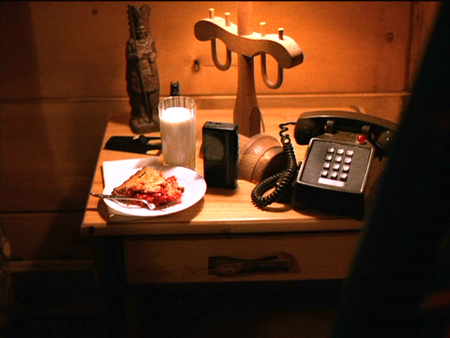
The next CHUD list: essential bedside items.
First,
some logistics. With the release of the 22-episode Season Two box set,
Paramount and fans are in a precarious position. It’s been six years since
Artisan dropped the Season One box, currently out of print and fetching $100+
on eBay. Furthermore, the original pilot has never graced a legit R1 DVD, in
either broadcast or recut European form. Jumping cold into the eighth episode,
the first in this set, is possible, but not advisable.
Hence:
precarious. Do you wait for the possible full collection, hopefully including
the pilot? Or, if you’ve got Artisan’s box set, do you pop for this and hope
for a standalone pilot disc? I’d planned to do a full show retrospective for
this set, but since newcomers have no way to see the pilot and first season,
I’m holding off for the rumored complete collection.
Strategizing
your approach to Peaks can be important. While the first season consists only
of a pristine pilot and seven focused, comparatively polished episodes, this
follow-up is as scattershot as possible. It opens and closes with a bang, but
in between dawdles down some very tangential, often maddeningly uninteresting
roads.
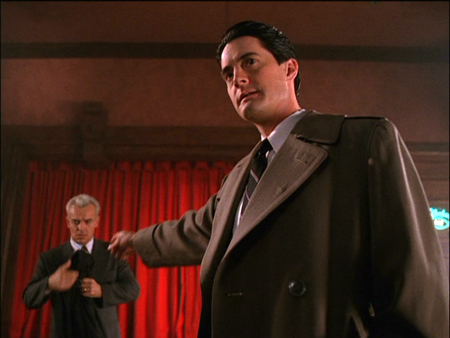
Coop always won when they played live action Swamp Thing trivia.
The crown
jewels are, predictably, three episodes directed by David Lynch. Elsewhere,
characterization suffered dramatically as the series struggled to create a new
identity focused on something other than Laura Palmer’s murder. Bobby Briggs is
a great example: suited up as Ben Horne’s sidekick one moment, back in high
school the next. Anything to facilitate a plot point. But Lynch never deviates
in his own episodes — his vision for each character is crystalline, which helps
make the downer ending palatable.
The
two-hour opener is a particularly confounding and entertaining piece of
television, with mysticism (the appearance of a giant at Cooper’s bedside) and
the unveiling of incest as one of the series’ defining themes. It’s also the
first time we catch a glimpse of what happened to Laura just before her death. Sheryl
Lee’s strobelit face, contorted in an animalistic scream, is one of the most
terrifying images in Lynch’s oeuvre, much less to ever hit broadcast
television.
And while
Lynch frequently took a hands-off approach the show after Laura’s killer was
revealed, he returned at the eleventh hour to direct the show’s last bow.
Whether it was End Day nihilism or simply a sense of finality, he dispatches
characters left and right (echoing dialogue from the season opener recounting
the previous finale’s violence) and leaves viewers with his most downbeat
ending since Eraserhead. That it still seems like such a great hour of
television is due both to Lynch’s confidence with his material and the pallor
of earlier episodes.
The rest
of the season is not as strong as those bookending chapters.
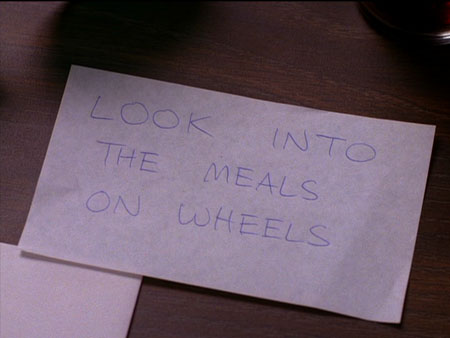
I asked Nick for a raise. I got this note.
Prior to
the resolution of Laura’s storyline, at least, the core writers (no doubt with
backstage nudges from Lynch) keep things on track. So the runup to a final
revelation of Laura’s killer still plays pretty well. In his own episodes (8
and 9) Lynch introduces a few topics that will become large plot points in his
absence: the escape of Coop’s malevolent ex-partner Windom Earle; Josie’s
possible dishonesty; Andy and Lucy’s problems; the secret work of Major Briggs.
The core,
right up to the penultimate episode in Laura’s core storyline, at least feels
right. It’s not cut from a thinner cloth than Season One…when Coop is onscreen,
at least. On the fringes you can see horrid subplots coming a mile away. They
ultimately point to the last interesting gasps of at least eight characters: Big
Ed, Nadine, Shelley, Mike, Bobby, Donna, James and Ben Horne.
And then
comes the sixteenth episode. Directed by Tim Hunter, this is the finale for one
important character and as close to a resolution as you’re going to get for
Laura Palmer. It feels pulled from another series entirely. The camera angles
are different, the rhythms of dialogue and pacing of scenes are new, and the
few stabs at recreating Lynch’s dreamlike atmosphere fall totally flat. If
there’s a single point in the show where everyone involved dropped the ball,
this was it.
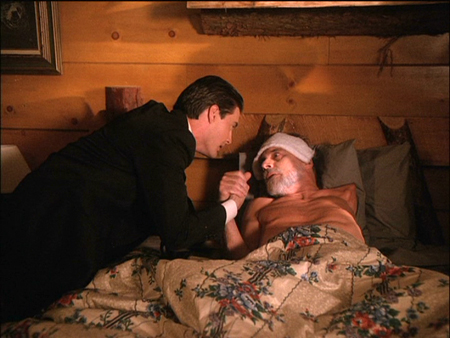
When homage goes too far.
From
there, commerce starts to beat the pants off art. With Lynch’s presence limited
to an entertaining dramatic turn as Coop’s boss Gordon Cole, currents of
melodrama become crashing waves, each incident of ‘weirdness’ feels calculated
and the void where Lynch’s inspired dreams should be is filled with tripe like
the vague implication of alien involvement. No shit.
That’s
well and good when you’ve also got David Duchovny running around as an FBI
agent in drag; it’s fun after all to argue that Peaks is a direct antecedent to
The X-Files. But that conversation takes five minutes, and afterward you’ve got
at least six episodes to contend with in which very little of note occurs.
There are fun guest stars like David Warner and Ted Raimi but they liven only a moment here
and there.
Several
plot threads are simply silly, if not annoying. All of the kids grow up too
fast, with varying degrees of veracity – the timeline for the entire series is
one month, as each episode occupies a single day. (More or less.) So Donna’s
overnight transformation from wallflower to vamp is foolish and irritating.
While Audrey begins the season positioned dangerously close to the network’s
first depiction of incest, she’s quickly turned into a pawn and then relegated
to melodramatic eye candy when her implied romance with Cooper was squashed
backstage.
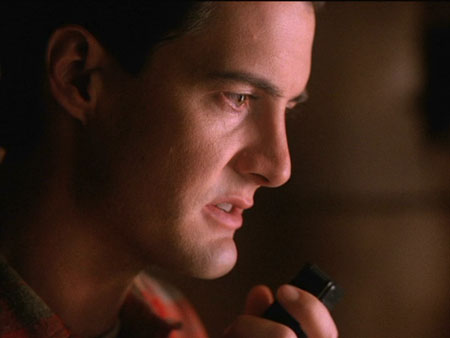
Diane, my story will never end. This troubles me.
‘Invitation
to Love’, the self-aware internal soap opera parody from Season One, is
replaced with outright soap content like Ian Buchanan’s self-absorbed dandy Richard
Tremayne and Chris Mulkey’s Hank Jennings, the go-to guy for generic violence.
Their storylines demonstrate precisely how thin the line original walked by
Lynch and Frost really was, as well as the degree to which the writers
overestimated the cast’s ability to play above the level of clunky plotting.
But it’s
James Hurley, never for one moment a compelling character, who lays the
cornerstone of the series’ worst storyline. Written out of Twin Peaks — the
town, not the series — James’ muddled tenure as a rich woman’s house boy clarifies
more quickly than any other story that while Lynch and Frost were able
satirists of the soap opera format, most TV writers just don’t get it. James, a
doe-eyed fop at best, becomes one of television’s best reasons to take a piss
and get another beer.
That’s
not to say that there’s nothing worth watching in the last ten episodes. Michael Parks has a great fake French accent. Billy
Zane is a treat as Audrey’s romantic interest John Justice Wheeler and Albert
Rosenfeld pops up now and again, allowing Miguel Ferrer to proffer a genuine
character arc in about ten lines of dialogue.

Oh yeah, McGill? Now you’re one of The People Under My Fist.
My best
advice: Fast-forward through any scene that doesn’t feature Coop, Windom Earle
or Audrey and you’ll have a three-hour movie that approximates the tone and
content of the best episodes.
As bad as
a couple subplots become, it’s not so much that the series turns rotten, but
that it becomes a different show altogether, one content to provide cheap,
impulsive and easy entertainment. Though some major characteristics remain
(unnaturally long takes, Badalamenti’s music) many disappear without a trace: largely
gone are quiet scene settings and the moments of introspection.
That’s
probably not lost on Lynch, who took the show’s latent doppelganger motif and
worked it full-scale into the wildly creepy finale. Once Laura’s murder is
solved, a different entity takes the place of the
deceptive as the frustrating end to Dale Cooper’s unpredictable story.
The Package
There’s
not a lot of packaging here to remark upon, but the basic aesthetics at least
keep to the old Artisan set. Instead of a massive fold-out, we’ve got three
slimline cases with two discs each and basic artwork. The extras are similarly
stripped-down: Log Lady introductions (which look much the worse for wear) and
a few interviews. Anyone expecting some sort of massive revelation in supplemental
form should remember what they’re dealing with and be happy to have the
episodes at all.
These
transfers are often wonderful when it comes to detail. I can see wood grain the one-eyed Jacks sign and
bruises on Coop (after being shot) that I never saw before. It’s still rather
noisy — no surprise, given the original source — but this is probably the
best Peaks has looked since broadcast. Makeup on several characters is also a
lot more apparent, which gives away one character immediately, as if the
disguise had ever fooled anyone…you’ll also be unable to ignore the wobbling
jail cell wall when ____ Juggernauts into it the first time.
My only
complaint: it’s still quite red, which is evidently just the way the source
material looks. Sometimes that makes for muddy scenes.
The
interviews are limited to essentially one short talk per disc, with a crop of
cast interviews on disc six. No one talks for long, which actually isn’t bad,
and it’s great to see people like Dana Ashbrook and Don Davis show up. Sheryl
Lee is mysteriously absent, and of course Lynch is MIA as well. While I’d never
expect him to contribute an interview akin to the amazing one on Eraserhead,
hearing him talk about acting in the show rather than making it would be a
treat.
The menus
deserve a mention, for being both brief and attractive. Though they embody the
spirit of electricity that didn’t really enter the Peaks mythos until Fire Walk With Me, the displays
still feel appropriate, and don’t take up much of your time.
7 out of 10